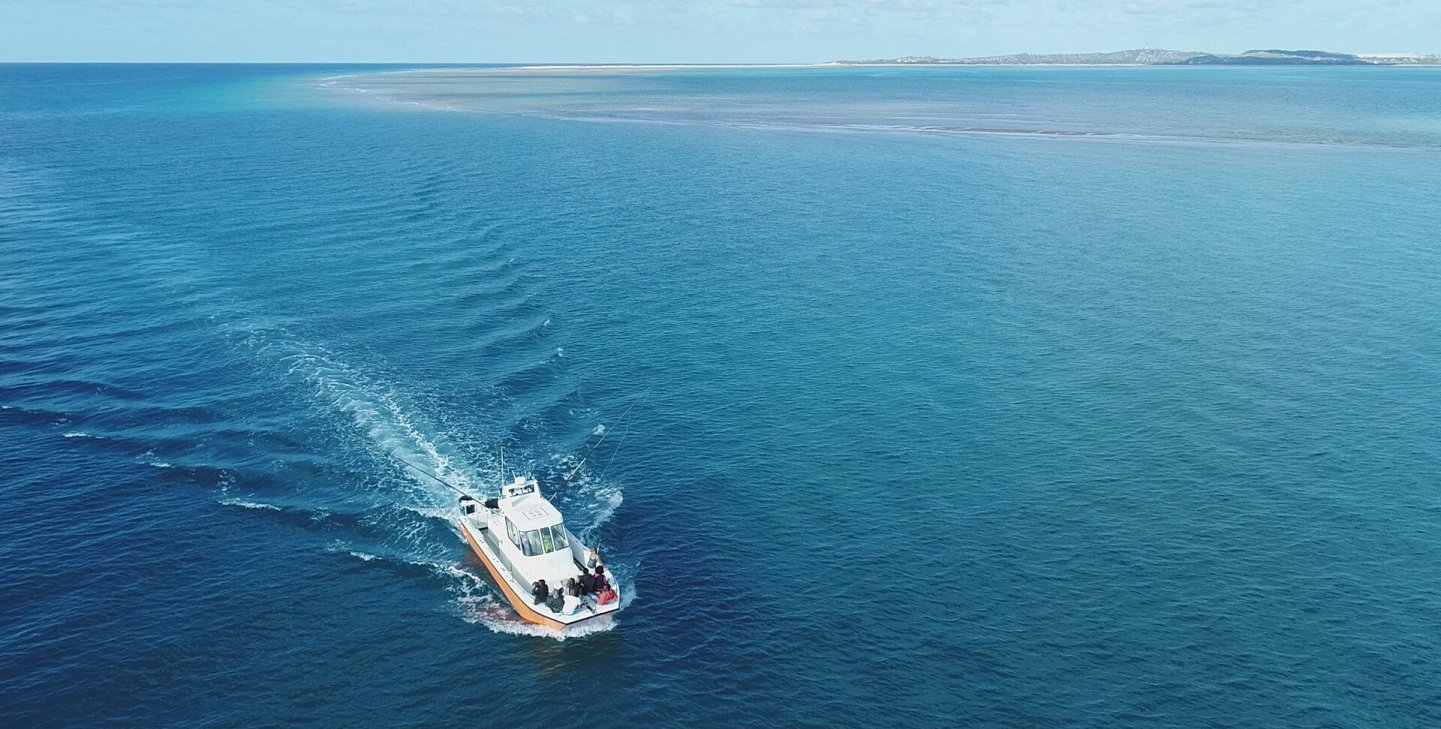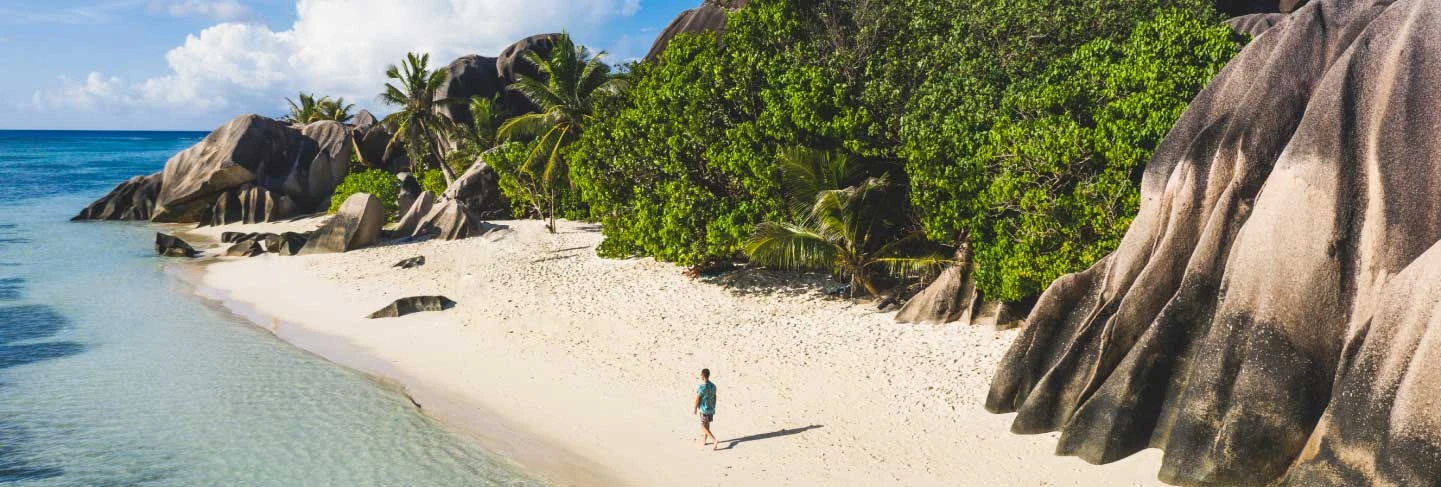Volunteer in Mozambique
Dive into marine research in Mozambique's stunning Bazaruto Archipelago.
Vibrant coral reefs, diverse marine life and stunning coastlines await in Mozambique! As a volunteer here, you will have the chance to contribute to marine studies in the breathtaking Bazaruto Archipelago. Work alongside local partners to preserve this biodiverse paradise while in impactful research efforts and immersing yourself in the local culture. Join us for an unforgettable adventure!
The Bazaruto Archipelago in Mozambique is a true marvel of the Indian Ocean. Its pristine beaches, towering sand dunes and lush forests create a mesmerising backdrop.
Beneath the surface, it’s a haven for marine life, from dugongs and sea turtles to sharks, manta rays and dolphins. With six different marine zones, the Bazaruto Archipelago National Park (BANP) is bursting with biodiversity.
Benguerra Island, one of the main spots in the archipelago, is a nature-lover’s dream. You’ll spot tons of birds, reptiles, amphibians, and a few furry friends too.
Volunteering in Mozambique offers a chance to explore its epic beauty while contributing to its preservation. Our volunteer work in Mozambique is driven by marine research objectives identified by local NGOs, making a significant difference and supporting various United Nations Sustainable Development Goals (UNSDGs).
Filter programs
Contribute to sustainable conservation projects led by experts.
Use your unique skills and expertise to support conservation projects.
The adventure of a lifetime while making an impact with a group of like-minded teens.
Generate solutions to help solve conservation challenges through research projects.
Turn your passion into your profession with a three-month placement at an NGO.
Step into the heart of southeastern Africa, where Mozambique’s coastal charm meets a world of cultural diversity and ecological wonders. Tucked between the Indian Ocean’s blue hues and the lush landscapes of Tanzania to the north and South Africa to the south, Mozambique serves up a blend of vibrant cities and pristine natural beauty.
Benguerra Island forms part of the Bazaruto Archipelago, Mozambique’s first and oldest marine protected area. Since 1971, the Bazaruto Archipelago has been a conservation area and national park, boasting unparalleled marine and terrestrial biodiversity. The archipelago is located near the mainland town of Vilanculos and comprises five islands: Bazaruto, Benguerra, Magaruque, Santa Carolina and Bangue.
The Bazaruto Archipelago National Park (BANP) was established to protect its diverse habitats, including coral reefs, seagrass meadows, mangrove forests, sandbanks, deep canyons and narrow shelves that connect with the open ocean.
The archipelago, home to the last viable population of dugongs in East Africa, is teeming with life, including sea turtles, sharks, manta rays, whales and dolphins.
Dugongs, often referred to as “sea cows,” are known for their slow, graceful movements and are closely related to manatees. These elusive creatures primarily feed on seagrass beds, which are abundant in the protected waters of the archipelago. Due to their dwindling numbers and critically endangered status, conservation efforts in Bazaruto are essential for their survival, making it a critical sanctuary for these gentle marine mammals.
We offer two volunteer programs in Mozambique, both based on Benguerra Island.
In our dolphin, turtle, shark and ray program, participants actively contribute to marine research efforts in the Bazaruto Archipelago through comprehensive training in survey techniques, data presentation and marine sensor operation.
Our PADI Divemaster and Marine Conservation Expedition program gives you the chance to become a certified PADI Divemaster while actively contributing to the preservation of extraordinary marine ecosystems.
Through each of these programs, you’ll have plenty of time to soak up the beauty of Benguerra Island’s underwater world, participating in at least two dives per week (weather permitting).
With a focus on marine research and exploration, these programs are aligned with several UN Sustainable Development Goals, including Quality Education (Goal 4), Climate Action (Goal 13), Life Below Water (Goal 14) and Partnerships for the Goals (Goal 17).
Which languages are spoken in Mozambique?
The languages commonly spoken in Mozambique are English and Portuguese.
What is the weather like on Benguerra Island?
Benguerra Island has two main seasons: dry (May to October) and wet (November to April). Dry months see temps of 20°C to 30°C (68°F to 86°F) with low humidity, while wet months heat up to 25°C to 35°C (77°F to 95°F) with heavy rain, especially from December to March.
How can I stay in touch with people back home?
While Wi-Fi on the island is available for WhatsApp and emails, it’s limited. For more extensive connectivity, consider purchasing a SIM card (Vodacom network) and topping up credit on the mainland for video calls or streaming. Keep in mind, however, that the internet can be unreliable, and you may experience occasional days without access.
Do I need any special qualifications to volunteer in Mozambique?
You don’t need any specific qualifications to become a GVI volunteer in Mozambique. Any training required for the volunteer program will be provided on base.
Do I need a diving qualification to join these programs?
All participants are required to have PADI Open Water certification before joining the dolphin, turtle, shark and ray volunteer program. If you’re not certified, we offer training at an additional fee to get you dive-ready. And if your last dive date is more than six months before the start date of your program, we can set you up with a refresher course. For our PADI Divemaster program, all PADI qualifications, from Open Water to Divemaster, are included in the program. Open Water training begins in week 1 of the program.
Where will I be staying while I volunteer in Mozambique?
While volunteering in Mozambique, you’ll stay in serviced dorm rooms with single and double bunk options and shared bathrooms. Enjoy communal areas with sofas, TV and limited Wi-Fi, plus access to a conference room, equipped laboratory, kitchen and a beach-front braai (BBQ) area at the dive centre.
Who will I be volunteering with?
At GVI, our volunteers come from all corners of the globe. It’s a chance to connect with people from different backgrounds and make unexpected friendships. By the end of your volunteering adventure, you’ll probably leave with some pretty awesome pals you never saw coming.
What can I do during my free time?
During your free time, you can enjoy our outdoor gym, walk around the villages, climb sand dunes, swim, read or watch TV. Optional weekend expeditions and extra activities like horse riding and sunset cruises are also available for an additional cost.









